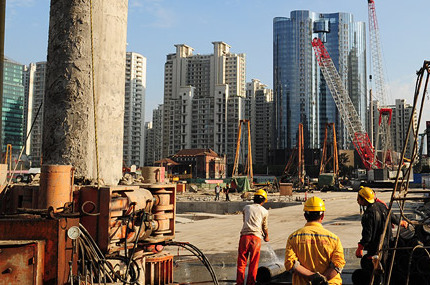Upholding public ownership at the 3rd plenum
- By Heiko Khoo
 0 Comment(s)
0 Comment(s) Print
Print E-mail China.org.cn, November 7, 2013
E-mail China.org.cn, November 7, 2013
As the Third Plenary Session of the 18th Central Committee of the Communist Party of China (CPC) prepared to meet, Western China experts expressed their hopes for a "capitalist style" reform agenda. The standard cries for an end to the leading role of state-owned enterprises were at the centre of this agenda.
|
|
|
The fundamental structure of China's economy in the reform era has acquired an experience-based rational form. |
The pro-capitalist Western media literally salivated when they read the China 2030 report prepared by a joint research team from the World Bank and the Development Research Center of China's State Council, published in February 2012. They interpreted its publication as signifying endorsement, at the highest levels of China's leadership, of a roadmap to create a capitalist economic system. However, the report was never a government statement of intent. It was just one of many reports written by different think tanks, which Party leaders use to inform their deliberations. In fact China 2030 was only published in Chinese in March 2013, a year after it was released in English.
It would save a lot of hot air if Western China watchers were to read China's Constitution. It states the following:
"The basis of the socialist economic system of the People's Republic of China is socialist public ownership of the means of production, namely, ownership by the whole people and collective ownership by the working people." (Article 6)
"The state economy is the sector of socialist economy under ownership by the whole people; it is the leading force in the national economy. The state ensures the consolidation and growth of the state economy." (Article 7)
"Socialist public property is sacred and inviolable. The state protects socialist public property. Appropriation or damage of state or collective property by any organization or individual by whatever means is prohibited." (Article 12)
In addition to the constitutional position, let's remember that the United States, Japan and Europe - the centers of world capitalism - remain in the mire of deep economic crisis. So, why on earth would China decide to privatize its state enterprises and banks when its economy has grown by nearly 50 percent since 2008, while the West has declined?
Criticism of China's system is ideologically driven, but it is couched in economic language, which is presented as if it were objective and neutral. It is not. Standard comments assert that China needs free prices, unimpeded competition and less planning. The Chicago school of economics led by Friedrich von Hayek developed this intellectual worldview. Hayek (1889-1992) claimed that it is impossible to calculate the diversity of human wants and needs by planning, so spontaneous regulation by means of money and personal interest, is, by definition, the most efficient and effective economic regulator.
In the 1930s Oskar Lange (1904-1965) produced a thorough rebuttal of Hayek's theory in his contributions to what became known as the Socialist Calculation Debate. Lange showed that state or publicly owned enterprises could adjust their prices and associated production according to supply and demand, just as efficiently, or even more so, than private enterprises. Of course, his model was just a theory. However, no country has proven him more correct than China. The idea that private ownership is the only means of incentivizing people to produce can be disproven by examples from both capitalism and planned economics.
Large capitalist companies operate by means of oligopolistic and monopolistic power. They squeeze out competitors: buy out competition; undercut it; flood markets and withhold scarce materials. Markets in the free market are not free. The only sure way for enterprises in a socialist society to compete with such vast capitalist enterprises is for the entire public sector to act as a combined force. Although the productivity of labor and profits in the public sector may not be as high as that in private enterprises, the total benefit to society is far greater. This means that profits going to the state can be invested to serve societal planning priorities. When the focus of production is to serve the needs of the people, this can act as a powerful inspiration for workers to produce more effectively.
In modern capitalism, when private companies are considered "too big to fail," they are given massive state bailouts, like those showered on Western banks in recent years. However, workers and their children are forced to pay for this. Vicious austerity measures are imposed on the people by governments, who are in the pay of powerful private business lobbies.
The fundamental structure of China's economy in the reform era has acquired an experience-based rational form. The central government organizes the state economy for macro-intervention, to anticipate future demands at the core of the socio-economic complex. Private enterprises are also able to flourish in these circumstances because there is a high degree of certainty in the external environment. This is achieved by means of state planning. This planning facilitates effective and rapid responses to unforeseen externalities, such as the 2008 Wenchuan earthquake, or the world economic crisis. Where sufficient state assets and resources remain in public hands, they can be rapidly and effectively mobilized to meet needs. China is right to maintain public ownership of the banks and state enterprises at the commanding heights of the economy. Other countries should follow this example.
The author is a columnist with China.org.cn. For more information please visit:
http://china.org.cn/opinion/heikokhoo.htm
Opinion articles reflect the views of their authors, not necessarily those of China.org.cn.






